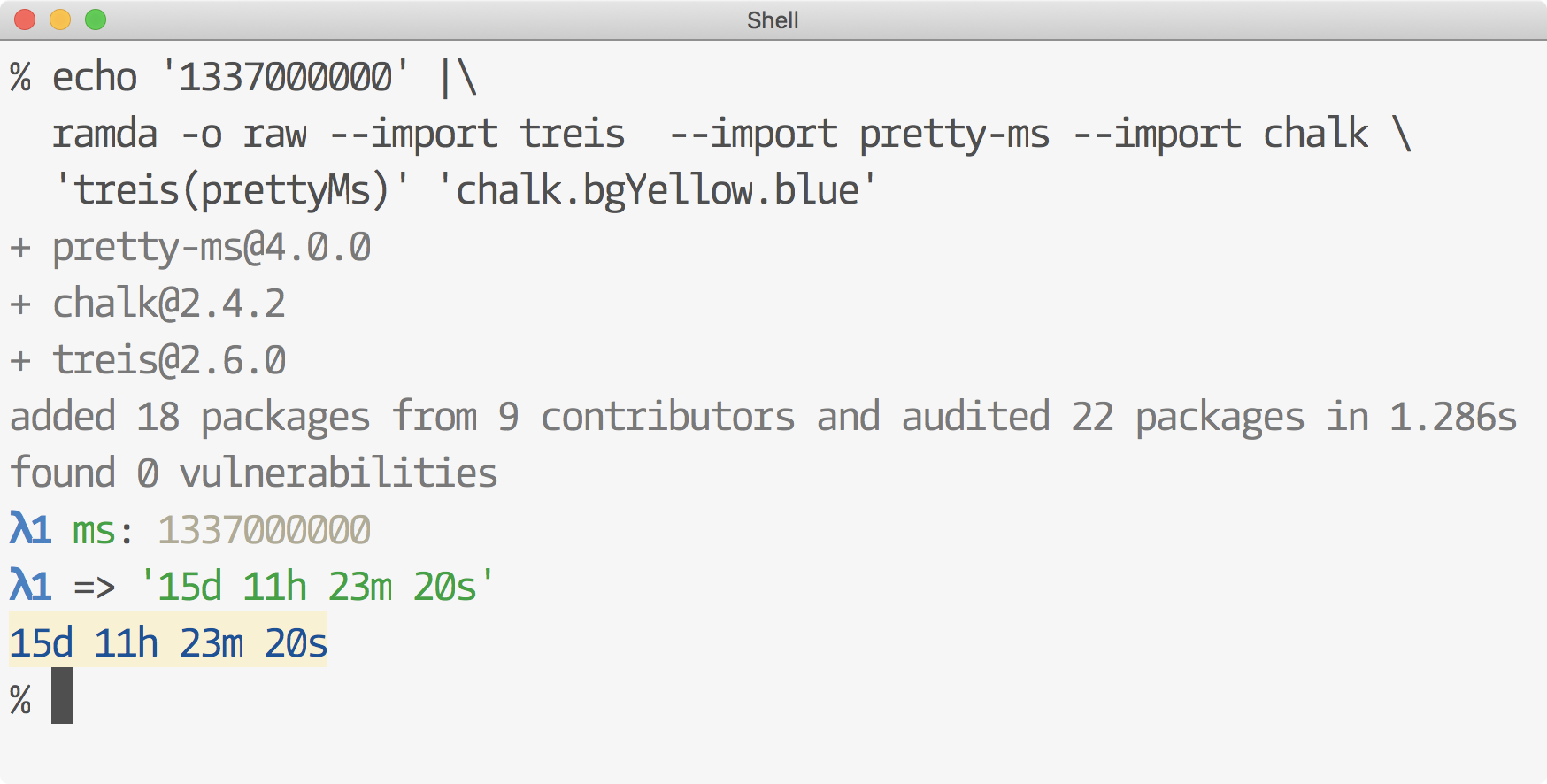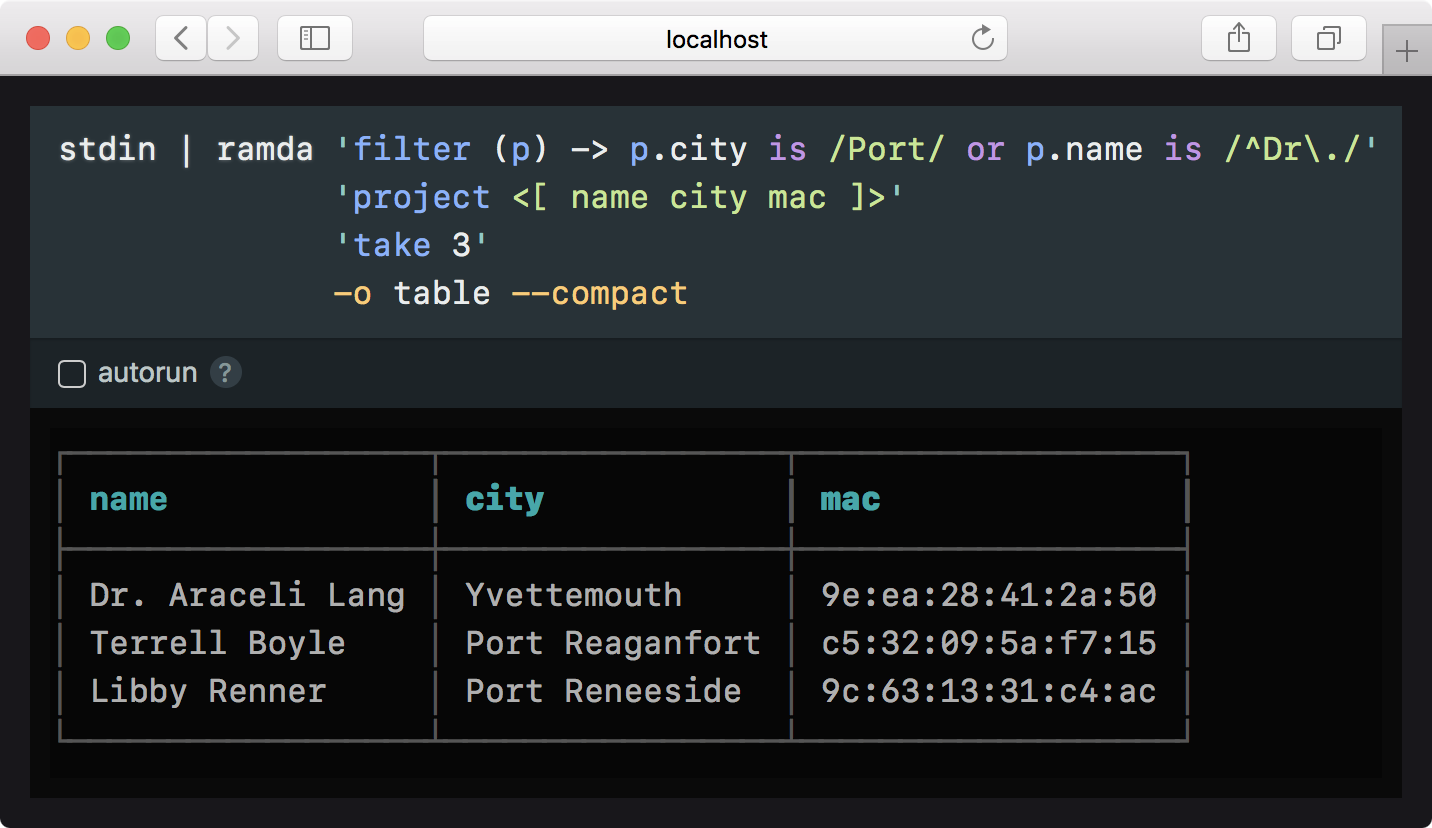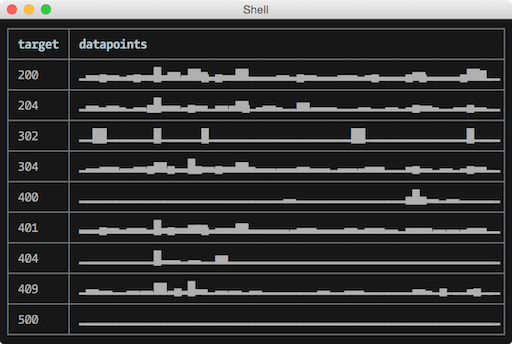https://github.com/raine/ramda-cli
:ram: A CLI tool for processing data with functional pipelines
https://github.com/raine/ramda-cli
cli json livescript ramda
Last synced: 5 months ago
JSON representation
:ram: A CLI tool for processing data with functional pipelines
- Host: GitHub
- URL: https://github.com/raine/ramda-cli
- Owner: raine
- License: isc
- Created: 2015-05-10T18:30:09.000Z (almost 11 years ago)
- Default Branch: master
- Last Pushed: 2022-12-30T17:04:49.000Z (about 3 years ago)
- Last Synced: 2025-10-04T07:37:07.371Z (5 months ago)
- Topics: cli, json, livescript, ramda
- Language: LiveScript
- Homepage:
- Size: 3.09 MB
- Stars: 576
- Watchers: 14
- Forks: 12
- Open Issues: 26
-
Metadata Files:
- Readme: README.md
- Changelog: CHANGELOG.md
- License: LICENSE
Awesome Lists containing this project
- awesome-cli-apps - ramda-cli - Process data with functional pipelines. (Data Manipulation / Processors)
- fucking-awesome-cli-apps - ramda-cli - Process data with functional pipelines. (Data Manipulation / Processors)
- awesome-cli-apps-in-a-csv - ramda-cli - A tool for processing data with functional pipelines. (<a name="data-management"></a>Data management)
- awesome-cli-apps - ramda-cli - A tool for processing data with functional pipelines. (<a name="data-management"></a>Data management)
README
# 🐑 ramda-cli [](https://www.npmjs.com/package/ramda-cli) [][gitter]
A tool for processing data with functional pipelines. In the command-line or
interactively in browser.
```sh
$ npm install -g ramda-cli
$ curl -Ls https://bit.ly/gist-people-json | ramda \
'filter (p) -> p.city?.match /Port/ or p.name.match /^Dr\./' \
'map pick ["name", "city", "mac"]' \
'take 3' \
-o table --compact
┌──────────────────┬─────────────────┬───────────────────┐
│ name │ city │ mac │
├──────────────────┼─────────────────┼───────────────────┤
│ Dr. Araceli Lang │ Yvettemouth │ 9e:ea:28:41:2a:50 │
│ Terrell Boyle │ Port Reaganfort │ c5:32:09:5a:f7:15 │
│ Libby Renner │ Port Reneeside │ 9c:63:13:31:c4:ac │
└──────────────────┴─────────────────┴───────────────────┘
```
Or, pass in [`--interactive`](#interactive-mode) to launch in browser.

## ✨ highlights
- Build elegant data-processing pipelines in the command-line with Ramda's data-last API
- No new syntax to learn: Use LiveScript or JavaScript, and the functions you know from Ramda
- Use any npm module seamlessly
- Interactive mode for building pipelines iteratively with instant feedback
##### Table of Contents
- [Interactive mode](#interactive-mode)
- [Examples](#examples)
- [JavaScript](#using-javascript)
- [Options](#options)
- [Evaluation context](#evaluation-context)
- [Configuration](#configuration)
- [Using packages from npm](#using-packages-from-npm)
- [Promises](#promises)
- [Debugging](#debugging)
- [LiveScript?](#livescript)
##### Resources
- [Cookbook][cookbook]
- [Tutorial: Using ramda-cli to process and display data from GitHub API][tutorial]
- [Essential LiveScript for ramda-cli][essential-livescript]
## install
```sh
npm install -g ramda-cli
```
## synopsis
```sh
cat data.json | ramda [function] ...
```
The idea is to [compose][composition] functions into a pipeline of operations
that when applied to given data, produces the desired output.
By default, the function is applied to a stream of JSON data read from stdin,
and the output data is sent to standard out as JSON.
Technically, `function` should be a snippet of LiveScript (or JavaScript with
`--js`) that evaluates into a function. If multiple `function` arguments are
supplied as positional arguments, they are composed into a pipeline in order
from left to right.
For example, the command
```sh
echo '[1,2,3]' | ramda 'filter (> 1)' 'map multiply 2' 'product'
24
```
is roughly equivalent in the following operation:
```js
R.pipe(
JSON.parse,
R.filter(x => x > 1),
R.map(R.multiply(2)),
R.product,
JSON.stringify
)('[1,2,3]') // "24"
```
(see [`R.pipe`](http://ramdajs.com/docs/#pipe)).
All Ramda's functions are available directly in the context. See
http://ramdajs.com/docs/ for a full list and [Evaluation
context](#evaluation-context) section for other functions.
## interactive mode
**New in v4.0**
When launched with the `--interactive` parameter, ramda-cli opens in the
browser. The pipeline, if given, is placed in an embedded code editor that
emulates the prompt in command-line. As the pipeline is edited, changes to
output are reflected below in the output panel.
In interactive mode, ramda-cli is generally operated the same way as on the
command-line. The key benefit is being able to develop pipelines incrementally
with much shorter feedback cycle.
Input is passed to interactive mode in stdin, as usual.
You may pipe stdout to other commands even when using interactive mode. When the
interactive mode tab is closed, the result will printed to stdout.
### copy-pasteable example
```sh
curl -Ls http://bit.ly/gist-people-json | npx ramda-cli \
'filter (p) -> p.city is /Port/ or p.name is /^Dr\./' \
'filter (p) -> p.email?.includes ".info"' \
'project <[ name city mac email ]>' \
'take 100' \
--interactive \
-o table --compact
```
## examples
```sh
# Add 1 to each value in a list
echo [1,2,3] | ramda 'map add 1'
[
2,
3,
4
]
```
```sh
# Add 1 to each value with inline ES6 lambda and take product of all
echo [1,2,3] | ramda --js 'map(x => x + 1)' product
24
```
> Ramda functions used:
> [`add`](http://ramdajs.com/docs/#add),
> [`map`](http://ramdajs.com/docs/#map),
> [`product`](http://ramdajs.com/docs/#product)
##### Get a list of people whose first name starts with "B"
```sh
cat people.json | ramda 'pluck \name' 'filter (name) -> name.0 is \B)' -o raw
Brando Jacobson
Betsy Bayer
Beverly Gleichner
Beryl Lindgren
```
> Ramda functions used:
> [`pluck`](http://ramdajs.com/docs/#pluck),
> [`filter`](http://ramdajs.com/docs/#filter)
> Data: [people.json](https://gist.githubusercontent.com/raine/cd11686e0b8a4a43bbf6/raw/people.json)
##### Create a markdown TODO list
```sh
curl -s http://jsonplaceholder.typicode.com/todos |\
ramda --raw-output \
'filter where-eq user-id: 10' \
'map (t) -> "- [#{t.completed && "x" || " "}] #{t.title}"' \
'take 5' \
'unlines'
```
__Output__
- [ ] ut cupiditate sequi aliquam fuga maiores
- [x] inventore saepe cumque et aut illum enim
- [x] omnis nulla eum aliquam distinctio
- [ ] molestias modi perferendis perspiciatis
- [ ] voluptates dignissimos sed doloribus animi quaerat aut
> Ramda functions used:
> [`filter`](http://ramdajs.com/docs/#filter),
> [`where-eq`](http://ramdajs.com/docs/#whereEq),
> [`map`](http://ramdajs.com/docs/#map)
##### List versions of a npm module with ISO times formatted using a module from npm
```sh
npm view ramda --json | ramda --import time-ago:ta \
'prop "time"' \
'to-pairs' \
'map -> version: it.0, time: ta.ago(it.1)' \
'reverse' \
-o table --compact
...
┌───────────────┬──────────────┐
│ version │ time │
├───────────────┼──────────────┤
│ 0.26.1 │ 1 month ago │
│ 0.26.0 │ 2 months ago │
│ 0.25.0 │ 1 year ago │
│ 0.24.1-es.rc3 │ 1 year ago │
│ 0.24.1-es.rc2 │ 1 year ago │
...
```
##### Search twitter for people who tweeted about ramda and pretty print [the result](https://raw.githubusercontent.com/raine/ramda-cli/media/twarc-ramda.png)
```sh
twarc.py --search '#ramda' | ramda --slurp -p 'map path [\user, \screen_name]' uniq
```
> Ramda functions used:
> [`map`](http://ramdajs.com/docs/#map),
> [`path`](http://ramdajs.com/docs/#path)
##### Pull response status data from Graphite and visualize
HTTP status codes per minute for last hour:
```sh
graphite -t "summarize(stats_counts.status_codes.*, '1min', 'sum', false)" -f '-1h' -o json | \
ramda --import sparkline 'map evolve datapoints: (map head) >> sparkline \
'sort-by prop \target' -o table
```
> Ramda functions used:
> [`evolve`](http://ramdajs.com/docs/#evolve),
> [`sortBy`](http://ramdajs.com/docs/#sortBy)
##### Use `--slurp` to read multiple JSON objects into a single list before any operations
```sh
cat < `date "+%Y%m%d"`.csv `# print output as csv to a file named as the current date`
```
##### List a project's dependencies in a table
```sh
npm ls --json | ramda 'prop \dependencies' 'map-obj prop \version' -o table --compact
┌───────────────┬────────┐
│ JSONStream │ 1.0.4 │
│ treis │ 2.3.9 │
│ ramda │ 0.14.0 │
│ livescript │ 1.4.0 │
│ cli-table │ 0.3.1 │
└───────────────┴────────┘
```
> Ramda functions used:
> [`filter`](http://ramdajs.com/docs/#filter),
> [`where`](http://ramdajs.com/docs/#where),
> [`project`](http://ramdajs.com/docs/#project),
> [`mapObj`](http://ramdajs.com/docs/#mapObj),
> [`prop`](http://ramdajs.com/docs/#prop)
##### Generate HTML with hyperscript
```sh
cat < shopping.txt
milk
cheese
peanuts
EOF
```
```sh
cat shopping.txt | ramda --import hyperscript:h \
-rR --slurp `# read raw input into a list` \
'map (h \li.item, _)' `# apply
'h \ul#list, _' `# wrap list inside
- ` \
- milk
- cheese
- peanuts
'.outer-HTML' `# finally, grab the HTML`
```
```html
```
Reason for underscores (e.g. `h \ul, _`) is that hyperscript API is not
curried (and can't be because it's variadic). We need to explicitly state
that this function is waiting for one more argument.
For more examples, see the [Cookbook][cookbook].
## using javascript
If LiveScript is not your thing, you may write pipelines in JavaScript using the
[`--js`](#--js) parameter.
```sh
echo '[1,2,3]' | ramda --js 'map(x => x + 1)'
[
2,
3,
4
]
```
## options
```
Usage: ramda [options] [function] ...
-I, --interactive run interactively in browser
-f, --file read a function from a js/ls file instead of args; useful for
larger scripts
-c, --compact compact output for JSON and tables
-s, --slurp read JSON objects from stdin as one big list
-S, --unslurp unwraps a list before output so that each item is formatted and
printed separately
-t, --transduce use pipeline as a transducer to transform stdin
-P, --json-path parse stream with JSONPath expression
-i, --input-type read input from stdin as (#{format-enum-list INPUT_TYPES})
-o, --output-type format output sent to stdout (#{format-enum-list OUTPUT_TYPES})
-p, --pretty pretty-printed output with colors, alias to -o pretty
-D, --pretty-depth set how deep objects are pretty printed
-r, --raw-input alias for --input-type raw
-R, --raw-output alias for --output-type raw
-n, --no-stdin don't read input from stdin
--[no-]headers csv/tsv has a header row
--csv-delimiter custom csv delimiter character
--js use javascript instead of livescript
--import import a module from npm
-C, --configure edit config in $EDITOR
-v, --verbose print debugging information (use -vv for even more)
--version print version
-h, --help displays help
```
#### `-I, --interactive`
Launch interactive mode in browser.
See [Interactive mode](#interactive-mode).
#### `-f, --file`
Load a function pipeline from a file. Useful for scripts difficult to express
in command-line.
__Example__
```js
// shout.js
var R = require('ramda');
module.exports = R.pipe(R.toUpper, R.add(R.__, '!'));
```
```sh
echo -n '"hello world"' | ramda --file shout.js
"HELLO WORLD!"
```
You can overwrite command-line arguments through the script by exporting a
string in property `opts`.
```js
module.exports = function() { /* ... */ }
module.exports.opts = '--slurp -o table'
```
#### `-c, --compact`
Print compact tables and JSON output without whitespace.
When used with `--output-type raw`, no line breaks are added to output.
__Example__
```sh
seq 10 | ramda --input-type raw --output-type raw --compact identity # or -rRc
12345678910%
```
#### `-s, --slurp`
Read all input from `stdin` and wrap the data in a list before operations.
__Example__
```sh
cat < Math.pow(x, 2))'
[
1,
4,
9
]
```
#### `--import `
Install given package from npm, and make it available in the pipeline.
Symbol `:` combined with a name can be used to declare the variable name module
should appear as. Otherwise, it is imported as camelcased name of the module.
Can be used multiple times to import more than one module.
__Example__
```sh
echo test | ramda -rR --import chalk:c 'c.bold'
**test**
```
#### `-C, --configure`
Edit ramda-cli config file in `$EDITOR`.
See [Configuration](#configuration).
## evaluation context
### functions
All of [Ramda's functions][ramda-docs] are available, and also:
| function | signature | description |
|----------------|------------------------------|--------------------------------------------------|
| `id` | `a → a` | Alias to `R.identity` |
| [`flat`][flat] | `* → Object` | Flatten a deep structure into a shallow object |
| `readFile` | `filePath → String` | Read a file as string |
| `lines` | `String → [String]` | Split a string into lines |
| `words` | `String → [String]` | Split a string into words |
| `unlines` | `[String] → String` | Join a list of lines into a string |
| `unwords` | `[String] → String` | Join a list of words into a string |
| `then` | `Function → Promise` | Map a value inside Promise |
| `pickDotPaths` | `[k] → {k: v} → {k: v}` | Like `R.pick` but deep using dot delimited paths |
| `renameKeysBy` | `Function → {k: v} → {k: v}` | Like `R.map` but for keys instead of values |
### objects
| object | description |
|-----------|-------------------------------------|
| `process` | https://nodejs.org/api/process.html |
| `console` | https://nodejs.org/api/console.html |
`process.exit()` can be used to short-circuit pipeline in case of an error,
for example:
```sh
curl api | ramda 'tap (res) -> if res.error then console.error(res); process.exit(1)'
```
An alternative is to use `Maybe` type.
## configuration
### config file
Path: `$HOME/.config/ramda-cli.{js,ls}`
The purpose of a global config file is to carry functions you might find
useful to have around. The functions it exports in an object are made
available.
For example,
```js
// ~/.config/ramda-cli.js
exports.date = (val) => new Date(val);
exports.timeago = require('timeago');
exports.debug = (val) => {
console.log('debug:', val);
return val;
};
```
```sh
echo 1442667243000 | ramda date debug timeago
debug: Sat Sep 19 2015 12:54:03 GMT+0000 (UTC)
"12 minutes ago"
```
### default options
To make some options be passed by default, it is best to use a shell alias.
For example:
```sh
# always interpret as javascript
alias ramda="ramda --js"
echo 1 | ramda '(x) => x + 1'
2
```
## using packages from npm
**New in v5.0**: `ramda-cli` installs specified modules transparently from npm,
manual installation is no longer required.
With the `--import` parameter, any module from npm can be installed and imported
into the pipeline context. Invocations with a particular module will be instant
once installed.

## promises
Promise values are unwrapped at the end of pipeline.
`then` helper function can be used to map promise values.
```sh
echo 1 | ramda --js 'x => Promise.resolve(x)' 'then(add(5))'
6
```
```sh
echo '192.168.1.1\ngoogle.com\nyahoo.com' | \
ramda -r --js --import ping 'ping.promise.probe' 'then(omit(["output", "numeric_host"]))' | \
ramda --slurp -o table --compact
┌─────────────┬───────┬─────────┬─────────┬─────────┬─────────┬────────┐
│ host │ alive │ time │ min │ max │ avg │ stddev │
├─────────────┼───────┼─────────┼─────────┼─────────┼─────────┼────────┤
│ 192.168.1.1 │ true │ 1.325 │ 1.325 │ 1.325 │ 1.325 │ 0.000 │
│ google.com │ true │ 10.729 │ 10.729 │ 10.729 │ 10.729 │ 0.000 │
│ yahoo.com │ true │ 115.418 │ 115.418 │ 115.418 │ 115.418 │ 0.000 │
└─────────────┴───────┴─────────┴─────────┴─────────┴─────────┴────────┘
```
## debugging
You can turn on the debug output with `-v, --verbose` flag. Use `-vv` for
even more verbose output.
Verbose output shows what entered LiveScript compiled to.
To debug individual functions in the pipeline, you can use something like [`treis`][treis].
```sh
echo 1 | ramda --import treis 'treis(add(1))'
```
```
f1 a: 1
f1 => 2
2
```
## livescript?
> [LiveScript][livescript] is a language which compiles to JavaScript. It has
a straightforward mapping to JavaScript and allows you to write expressive
code devoid of repetitive boilerplate.
### comparison table
All expressions in the table evaluate to a function, and are valid in
ramda-cli.
| Ramda | LiveScript | JavaScript |
|---------------------------|---------------------|---------------------------|
| `not` | `(not)` | `x => !x` |
| `nth(0)` | `(.0)` | `x => x[0]` |
| `prop('name')` | `(.name)` | `x => x.name` |
| `add(1)` | `(+ 1)` | `x => x + 1` |
| `add(__, '!')` | `(+ '!')` | `x => x + '!'` |
| `gt(__, 2)` | `(> 2)` | `x => x > 2` |
| `contains(__, xs)` | `(in xs)` | `x => xs.includes(x)` |
| `pipe(length, gt(__, 2))` | `(.length > 2)` | `x => x.length > 2 ` |
| `isNil` | `(~= null)` | `x => x == null` |
| `complement(isNil)` | `(!~= null)` | `x => x != null` |
| `match(/foo/)` | `(is /foo/)` | `x => x.match(/foo/)` |
| `replace('a', '')` | `(- 'a')` | `x => x.replace('a', '')` |
| `join(',')` | `(* ',')` | `x => x.join(',')` |
| `split(',')` | `(/ ',')` | `x => x.split(',')` |
| `toUpper` | `(.to-upper-case!)` | `x => x.toUpperCase()` |
See also: [Essential LiveScript for ramda-cli][essential-livescript]
## questions or suggestions?
[Open an issue](https://github.com/raine/ramda-cli/issues/new)
## contributors
- [Kun Zhou](https://github.com/mmqmzk)
[flat]: https://github.com/hughsk/flat
[composition]: http://en.wikipedia.org/wiki/Function_composition_%28computer_science%29
[livescript]: http://livescript.net
[treis]: https://github.com/raine/treis
[hyperscript]: https://github.com/dominictarr/hyperscript
[ramda]: http://ramdajs.com
[ramda-docs]: http://ramdajs.com/docs/
[tutorial]: https://gistlog.co/raine/d12d0ec3e72b2945510b
[essential-livescript]: https://gistlog.co/raine/6486b985c767954781b1
[cookbook]: https://github.com/raine/ramda-cli/wiki/Cookbook
[transducers-explained]: http://simplectic.com/blog/2014/transducers-explained-1/
[gitter]: https://gitter.im/raine/ramda-cli

